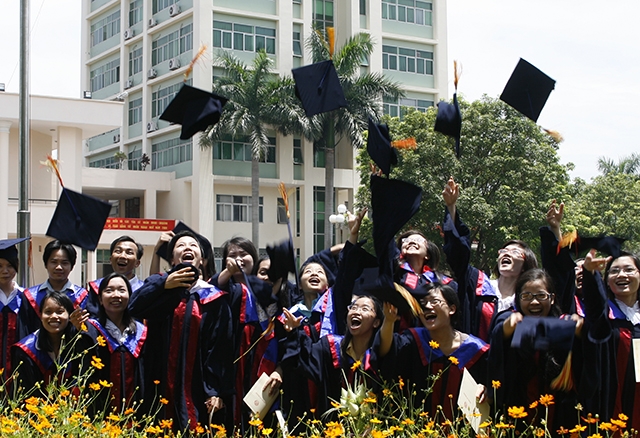The Ministry of Education and Training (MoET) is preparing to submit a long-awaited decree on university autonomy to the government in an attempt to assist the country’s universities, especially in terms of finance.

The proposal also aims at removing the current “management function” mechanism, by which each university has its own State agency as the “parent owner” without actual or effective authority.
“Universities will operate independently without a ministry above their heads,” Minister of Education and Training Phung Xuan Nha said.
He raised the proposal at a meeting with the Ho Chi Minh City Pedagogical University on June 7, adding that MoET will be the “line manager” in the education and training sector without interfering in universities’ operations.
Deputy Prime Minister Vu Duc Dam also touched on the matter during a working visit to Can Tho University on March 31.
He stressed that the notion of “parent owner” for universities should be removed and that universities be independent in academic issues, human resources, and finance.
“Autonomy in universities must be combined with accountability to improve the quality of graduates and ensure proper mechanisms for the poor to access education,” he said.
“Autonomy does not mean that the State ceases investing in education in general and in universities in particular.”
The State, however, will not continue to invest the same amount of money in universities without considering objective and subjective factors or investing in universities without the desired results.
“Education development in Vietnam should follow international education trends,” Deputy PM Dam believes.
Representatives from 61 universities, academies, and colleges under MoET have all affirmed that autonomy is a key solution in improving education quality, according to MoET.
They also agreed that legal documents are insufficient to guide universities to be autonomous and are sometimes in conflict with each other.
Universities have a different understanding on the matter of autonomy. Finances are not strong enough to attract well-qualified teachers and there are ceilings on tuition fees.
Issued in April last year, MoET’s Circular No. 07 stipulates the process for evaluating the quality of university graduates, from Bachelors to PhDs.
In November a draft legal document evaluating the quality of education and training was also issued. The two create a legal framework for universities to implement their rights to be autonomous.
Accordingly, MoET will not intervene in how universities create the standards students must meet to graduate.
Some universities, however, still believe that MoET will create these standards at each academic level.
In 2015, some 12 State-owned universities were granted approval to implement their rights to autonomy, up from six in 2006.
They have more authority since they are independent not only in expenditure but also in collecting tuition fees.
By 2020 Vietnam is to have 224 universities and 236 colleges under the government’s university master plan introduced in 2013.
In 2012 Vietnam had 421 universities and colleges, of which 50 were non-public universities and 30 were non-public colleges, according to the Association of Universities and Colleges Vietnam.
Vietnamese people spend among the most on education, a survey conducted by HSBC and released on June 8 found.
The survey also shows that Vietnamese spend some $3 billion each year on overseas studies.
There are some 110,000 Vietnamese students studying in 47 countries and territories. On average, each spends $30,000-$40,000 a year, the HSBC survey found.
Vietnam ranks sixth - after China, India, South Korea, Saudi Arabia, and Canada - in students at US institutions, mostly colleges and universities but also boarding and day schools.
“The financial sacrifices that parents are willing to make to fund their children’s education are proof of the unquestioning support they will give to help them achieve their ambitions,” said Mr. Kris Werner, Head of Retail Banking and Wealth Management at HSBC Vietnam.
“Many would also consider topping up a domestic university education with an overseas study program to increase their child’s chances of succeeding in their future careers.”
VN Economic Times